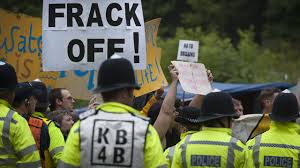Battle of Balcombe: Opposition to Cuadrilla Resources UK Fracking Plans

The idyllic village of Balcombe, just south of London, is a stronghold of the Conservative party. Just the sort of place that one might imagine cheering on industry plans to drill for natural gas and applaud the tax breaks that the government has offered to industry.
But 82 percent of the village voted firmly against plans by Cuadrilla Resources, headed by Lord John Browne, the former CEO of British Petroleum, to conduct hydraulic fracturing in their community. Over two dozen protestors have been arrested in the last few days for attempting to block company equipment – including Natalie Hynde and Simon Medhurst, a couple who glued themselves together this morning.
“We’ve exhausted all the options,” Georgia Lawe, who lives in the village, told the West Sussex County Times. “They have left us with no choice but to physically stand ourselves on the road between the site and the lorries.”
“We in Balcombe feel bullied. Bullied by the oil and gas industry. Bullied by our government,” Kathryn McWhirter of No Fracking in Balcombe Society (NoFiBS), told the BBC. “We stand strong in the fight against this dangerous and misguided government policy.”
“People will try to convince you that hydraulic fracking is going to be good for the country, that it’s going to bring jobs, that it’s going to make the price of fossil fuel cheaper – don’t be fooled,” added Bianca Jagger, the former wife of the Rolling Stones lead singer, who visited Balcombe this weekend to show her support. “The harm that it will cause to this beautiful area – they’re fooling you.”
Fracking – which is short for hydraulic fracturing – is not entirely new. Since the 1940s engineers have attempted to drill the deep underground reserves of gas and oil reserves. Advances in technology during the 1980s led to new horizontal hydraulic drilling techniques, which involves boring a mile deep into the earth and then pumping in millions of gallons of water, sand and hazardous chemicals to fracture rock and extract gas contained inside.
Across the U.S. a boom in horizontal fracking has taken place in the last few years – with major operations underway in states like Pennsylvania and North Dakota. Other countries from Bulgaria to the Ukraine in Eastern Europe have been targeted by companies like Chevron as has South Africa where Royal Dutch Shell, Falcon Oil & Gas and Bundu Oil & Gas are looking to drill in the Karoo National Park.
But to date no natural gas has been extracted by this technology in the UK. George Osborne, the Chancellor of the Exchequer, wants to change that. He has offered a low 30 percent tax rate for onshore shale gas production, compared to rates as high as 81 percent for older offshore fields in the North Sea.
Osborne’s plans were greeted by some surprise even by climate skeptics. “I think tax breaks are unnecessary for fracking, based on my knowledge of the oil and gas industry,” Peter Lilley, a Conservative member of Parliament said.
But other Conservative politicians have championed the cause. “Certainly in part of the north-east where there’s plenty of room for fracking, well away from anybody’s residence where we could conduct without any kind of threat to the rural environment,” Lord Howell, a former conservative energy advisor until this past April, told Parliament.
Unfortunately Howell’s remarks generated a major backlash against the fracking industry. “North-east England very beautiful, rugged, welcoming, inspiring, historic, advancing, not ‘desolate’,” tweeted Justin Welby, the archbishop of Canterbury.

